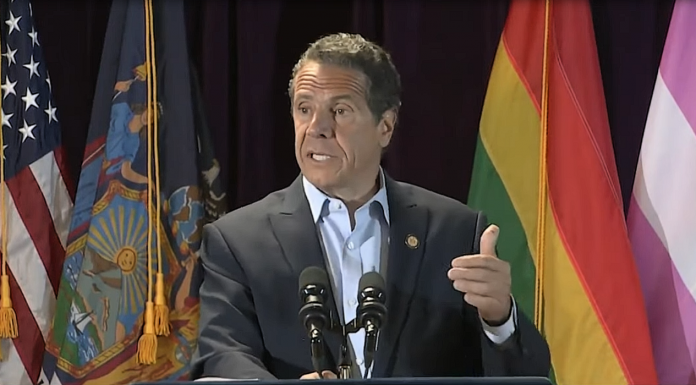New York Gov. Andrew Cuomo signed legislation, S.B. 2253, on Tuesday to repeal a law that prohibits “loitering for the purpose of engaging in a prostitution offense,” according to the governor’s office.
The 1976 anti-loitering law, which is found in Section 240.37 of the New York Penal Code, prohibits prostitutes from wandering in a place and repeatedly soliciting passersby.
Transgender political activists said police officers enforced the law as if it were a ban on “walking while trans,” since transgender people were arrested under the law for prostitute-like appearances and behaviors.
Local district attorneys had refused to prosecute violations of the law, leading Cuomo to sign off on its repeal.
“Repealing the archaic ‘walking while trans’ ban is a critical step toward reforming our policing system and reducing the harassment and criminalization transgender people face simply for being themselves,” Cuomo said.
Kings County District Attorney Eric Gonzalez announced last week that his office dismissed hundreds of warrants stemming from §240.37, the New York Daily News reported.
Transgender woman Norma Ureiro, a member of Make the Road New York, called the “loitering with the intent for prostitution” law “sexist, racist and transphobic.”
“Once, my boyfriend and I were arrested under the penal code 240.37 for simply walking together and holding hands, and until this day I still carry the scars and fears of the interaction with the police and the unjust arrest,” Ureiro said.
Prostitution remains a misdemeanor in New York under Section 230 in the Penal Code.
The repeal of §240.37 may amount to a de facto repeal of the state’s anti-prostitution laws, since it restricts law enforcement’s ability to arrest prostitutes for mere solicitation.
Instead, police officers will have the authority to arrest a prostitute only when they can prove that he or she “engages or agrees or offers to engage in sexual conduct with another person in return for a fee.”
Whether the law’s repeal effectively legalizes prostitution or not, the Democrat-controlled legislature had expressed that goal after the elections last year, the New York Daily News reported.
Part of the Democratic super majority’s legislative agenda includes a “Justice Roadmap” with multiple goals: decriminalizing prostitution, decriminalizing marijuana, throwing open the state’s prisons and protecting dangerous illegal aliens.
“With a supermajority in the state Senate, we have the opportunity to enact bold and common-sense legislation that can decrease the criminalization of our communities, reduce inhumane practices of incarceration and safeguard undocumented New Yorkers,” said Sen. Alessandra Biaggi, D-Bronx, about the project.
One of the group’s goals was to repeal the “walking while trans” ban, an issue which they cleverly framed to distract from their true aim.
Lawmakers who support the “Justice Roadmap” did not mention any other laws that would be needed to decriminalize prostitution.
At the least, the repeal of §240.37 will ensure that prostitutes and transgender women can present themselves in public without concern for decency or modesty.
“The ways women of color present themselves should never be policed, criminalized or result in an arrest or criminal record,” said Donna Lieberman, executive director of the New York Civil Liberties Union.

